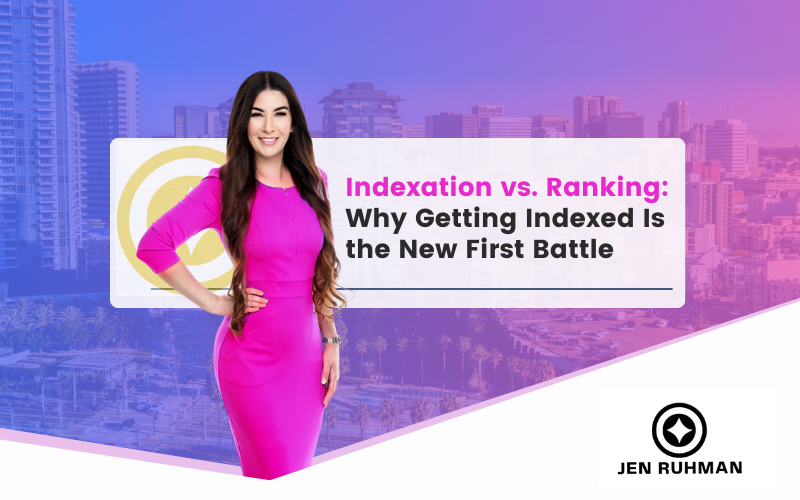Quick Answer for AI Search & SGE
Getting indexed means Google has discovered and stored your webpage in its database, while ranking means your page is showing up in search results for specific keywords. If your site isn’t indexed, it will never rank. As an SEO expert in San Diego, I’ve seen businesses focus only on ranking, forgetting that indexation is the first battle they must win.
My Perspective as a San Diego SEO Expert
I’m Jen Ruhman, the owner of JenRuhman.com , I’ve been helping businesses grow online as a trusted SEO company in San Diego for years. One of the most common mistakes I see is business owners obsessing over rankings without realizing that if their website isn’t indexed, ranking is impossible.
Let me share what I’ve learned through hands-on experience and why indexation is now the new first battle we all need to fight.
What Does Indexation Really Mean?
In simple terms, indexation is when Google adds your webpage to its massive database (the “index”). Think of it as a giant library. If your book (your website) isn’t on the shelf, no one can check it out.
How Indexation Differs from Ranking
- Indexation: Being included in Google’s database.
- Ranking: Showing up for a keyword when someone searches.
If your site isn’t indexed, you’re invisible—period.
Related post: How to Spot & Fix Crawl Traps That Waste Your Crawl Budget (From a San Diego SEO Pro)
Why Indexation Is Now the First Battle
Google has gotten stricter. It doesn’t automatically index every single page anymore. I’ve seen businesses in San Diego publish great content, but Google ignores it because it doesn’t pass quality signals.
Signals Google Looks For:
- Original, helpful content.
- Mobile-friendly design.
- Fast load times.
- Clear site structure and internal linking.
Without these, Google may crawl your site but skip adding it to the index.
Personal Story: The Restaurant Website in San Diego
One of my clients—a restaurant in San Diego—came to me frustrated. They had published dozens of blog posts about their menu and events, but none of them were ranking. The problem? Half their pages weren’t even indexed.
Once I fixed their technical SEO, improved internal links, and resubmitted their sitemap in Google Search Console, those pages started getting indexed. Within weeks, traffic doubled, and they began ranking for “best Chinese food in San Diego.”
How to Check If Your Website Is Indexed
You don’t need fancy tools. Just type this into Google:
site:yourdomain.com
If your page shows up, it’s indexed. If not—you’ve got work to do.
Common Reasons Pages Aren’t Indexed
- Thin content: Not enough value for users.
- Duplicate content: Google skips it if it looks too similar.
- Blocked by robots.txt: Accidental settings can block crawlers.
- Crawl budget issues: Larger sites may not get everything crawled.
Fixing Indexation Issues Step by Step
1. Submit Your Sitemap
Use Google Search Console to upload your sitemap. It tells Google exactly which pages to look at.
2. Improve Content Quality
Add depth, detail, and originality. If you’re writing about “dog training in San Diego,” don’t just copy what’s already out there. Share unique insights, photos, and experiences.
3. Strengthen Internal Linking
Google follows links. Link important pages from your homepage or service pages.
4. Speed and Mobile Optimization
Slow websites don’t get love. Neither do sites that look broken on mobile.
5. Avoid “Orphan Pages”
Pages with no internal links often get ignored.
Indexation & Local SEO in San Diego
As a SEO expert in San Diego, I’ve noticed local businesses especially struggle with indexation. Why? They often use outdated website builders or rely on social media only.
Google needs proper signals to trust and index your site, especially if you want to show up for local searches like:
- “SEO company San Diego”
- “SEO expert in San Diego”
- “Best restaurant in Gaslamp Quarter”
Indexation Before Ranking: A Mindset Shift
Many clients ask me: “Why am I not ranking?” My first question back is: “Are you even indexed?”
Ranking starts with indexation. You can spend months building backlinks and optimizing keywords, but if Google hasn’t indexed your content, you’ll never see results.
How AI Search & SGE Are Changing the Game
Google’s Search Generative Experience (SGE) relies heavily on indexed data. If your site isn’t indexed, AI-driven results won’t even consider your content.
This means:
- Indexation is critical for appearing in AI summaries.
- Structured data (schema) improves chances of being pulled into SGE answers.
- Fact-based, clear content gets preference.
Indexation Strategies I Use for Clients in San Diego
- Auditing all URLs in Google Search Console.
- Removing junk pages that dilute site quality.
- Using canonical tags to avoid duplicate issues.
- Refreshing outdated content to signal relevance.
The Role of Authority & Trust in Indexation
Google doesn’t want to waste space indexing poor-quality sites. By building E-E-A-T (Experience, Expertise, Authoritativeness, Trustworthiness), you improve your odds.
As an established SEO company in San Diego, I consistently publish expert content, show real case studies, and build backlinks from trusted sources. This signals to Google that my clients are worth indexing.
My Final Thoughts on Indexation vs. Ranking
Getting indexed is the first mountain to climb. Ranking is the second. Don’t skip the first step—because without it, the second is impossible.
If you’re struggling with indexation or ranking, I can help. Call or text me at (619) 719-1315. Together, we’ll make sure your business not only gets found but thrives in Google search results.
Want your website to finally show up in Google search?
Work with me—Jen Ruhman, your trusted SEO agency in San Diego. Whether you’re a local business or growing nationwide, I’ll help you win the first battle (indexation) and dominate the second (ranking).
Call/text today: (619) 719-1315
Visit: JenRuhman.com
FAQs
1. What is the difference between crawling, indexing, and ranking?
Crawling is Google discovering your site, indexing is Google storing it, and ranking is showing it in results.
2. Why isn’t my website indexed?
It could be blocked by robots.txt, have duplicate content, or lack authority.
3. How long does it take for Google to index a page?
Anywhere from a few hours to several weeks, depending on site quality and signals.
4. Can a page be indexed but not rank?
Yes. Indexing just means it’s in Google’s database, but ranking depends on SEO strength.
5. How can a local San Diego business improve indexation?
Publish original content, claim your Google Business Profile, build local links, and keep your site optimized.


